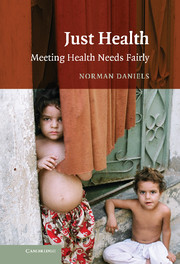Book contents
- Frontmatter
- Contents
- Acknowledgments
- Introduction
- PART I A THEORY OF JUSTICE AND HEALTH
- PART II CHALLENGES
- PART III USES
- 9 Fairness in Health Sector Reform
- 10 Accountability for Reasonableness in Developing Countries
- 11 Reducing Health Disparities
- 12 Priority Setting and Human Rights
- 13 International Health Inequalities and Global Justice
- References
- Index
13 - International Health Inequalities and Global Justice
A Concluding Challenge
Published online by Cambridge University Press: 05 June 2012
- Frontmatter
- Contents
- Acknowledgments
- Introduction
- PART I A THEORY OF JUSTICE AND HEALTH
- PART II CHALLENGES
- PART III USES
- 9 Fairness in Health Sector Reform
- 10 Accountability for Reasonableness in Developing Countries
- 11 Reducing Health Disparities
- 12 Priority Setting and Human Rights
- 13 International Health Inequalities and Global Justice
- References
- Index
Summary
Disturbing international inequalities in health abound. Life expectancy in Swaziland is half that in Japan. A child unfortunate enough to be born in Angola has seventy-three times as great a chance of dying before age five as a child born in Norway. A mother giving birth in southern sub-Saharan Africa has 100 times as great a chance of dying in labor as one birthing in an industrialized country. For every mile one travels outward toward the Maryland suburbs from downtown Washington, DC, on its underground rail system, life expectancy rises by a year – reflecting the race and class inequities in American health. Are the glaring, even larger, international health inequalities also unjust?
All of us no doubt think that they are grossly unfortunate. Many of us think that they are unfair or unjust. Why should some people be at such a health disadvantage through no fault of their own, losers in a natural and social lottery assigning them birth in an unhealthy place? Others of us are troubled by the absence of the kinds of human relationships that ordinarily give rise to the claims of egalitarian justice that we make on each other – for example, being fellow citizens or even interacting in a cooperative scheme. Who has obligations of justice to reduce these international inequalities? And do those obligations hold regardless of how the inequalities came about? What institutions are accountable for addressing them?
- Type
- Chapter
- Information
- Just HealthMeeting Health Needs Fairly, pp. 333 - 356Publisher: Cambridge University PressPrint publication year: 2007
- 1
- Cited by



